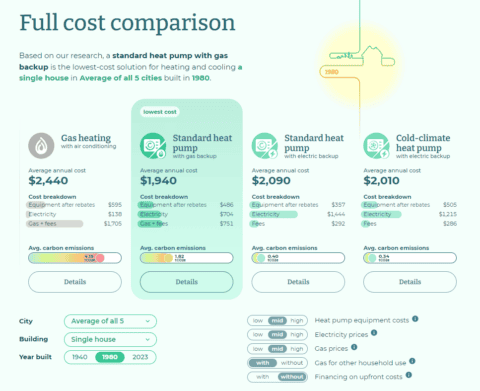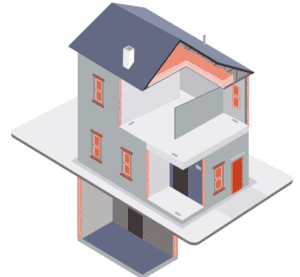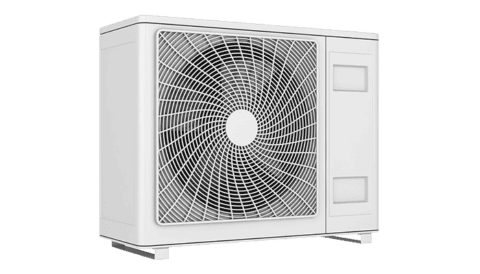
Heat pumps are 2-5 times more efficient than a natural gas furnace.
And up to 50% more efficient for cooling than an air conditioning (AC) unit.
The higher efficiency of the heat pump can translate into significant energy use reductions. Actual savings in your house will depend on a number of factors, including your local climate, efficiency of your current system, size and type of heat pump, and the control strategy.
Heat pumps are a proven and reliable technology in Canada, capable of providing year-round comfort control for your home by supplying heat in the winter, cooling in the summer, and in some cases, heating hot water for your home.
If you are exploring options to heat and cool your home or reduce your energy bills, you might want to consider a heat pump.
In Canada, home energy use is mostly space heating.
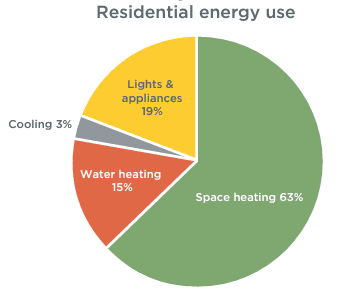
Followed by hot water heating, lighting and appliances.
Space and water heating are usually provided by fossil fuels, where the switch to heat pumps can both eliminate fossil fuel use, and significantly increase the efficiency of supplying the energy. Switching to heat pumps typically reduces energy consumption by two-thirds.
Even in provinces with abundant hydroelectricity (notably Quebec, Manitoba, and British Columbia) and widespread electric heating, switching to heat pumps which have far higher efficiency is highly cost-effective and frees up large amounts of electricity supply for replacing fossil fuel elsewhere.
..replacing a gas furnace and an air conditioner
Canadian Climate Institute
with an air-source heat pump would typically save money
in Vancouver, Toronto, Montreal and Halifax.

What is an Air Source Heat Pump (ASHP)?
The technology in a heat pump is similar to your refrigerator or an air conditioner.
During the cooler months, a heat pump uses electricity to extract heat from the outside air and transfer it into your home. The heat pump’s advanced technology enables it, even during Canada’s cold winter days, to extract heat from the outside air to heat your home. Although heat pumps are best known for heating, they also provide cooling by transferring warm indoor air to the outside. In fact, if you have an air conditioner at home, you are already familiar with heat pump technology – they work in the same way.
Heat pumps transfer heat rather than generate heat, making them energy-efficient while they provide comfortable temperatures for your home year-round.
Learn more in this booklet from Natural Resources Canada, Heating and Cooling with a Heat Pump.
Calculate how much you could save with a heat pump
Heat pumps would typically save you money in Vancouver, Toronto, Montreal and Halifax.
This interactive tool helps you to compare the cost of heat pumps to other home heating and cooling options in five cities across Canada. It was developed by experts at the Canadian Climate Institute based on extensive economic analysis.
Results reflect average costs over the lifetime of the equipment and do not reflect individual circumstances of each user.
Visit https://heatpumpcalculator.ca to calculate heat pump savings for your region.

Do heat pumps work in Canadian cold?
Like most emerging technologies…there appear myths about heat pumps that often aren’t true.
Myth (FALSE)
Heat pumps don’t work in cold climates…but Norway, Sweden, and Finland have 40 heat pumps per 100 households and the most of any countries in the world.
Myth (DOESN’T TELL WHOLE STORY)
Heat Pumps don’t work if the power goes off…but guess what neither does your natural gas furnace or electric baseboard heaters ;}
Myth (FALSE)
In provinces with dirty grids, heat pumps don’t lower emissions….Heat pumps can lower emissions even on dirty grids because they are very energy efficient. And electrical grids are getting cleaner over time. Adding solar is also an option for homeowners on-site.
Read about the many myths about heat pumps (hint: modern heat pumps work in almost all parts of Canada)
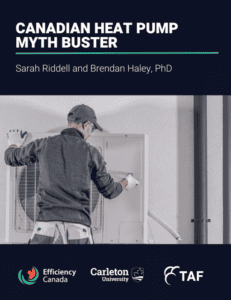
Heat pumps have been used in Canada for decades. In 2005, there were almost half a million heat pumps in Canadian homes. That doubled to almost a million by 2020 which was about 6% of all home heating in the country.
In the recent deep freeze of January 2024 in Western Canada, heat pumps performed well as shown in this report A look at heat pumps and high-performance homes during Alberta’s cold snap
Heat pumps are far more efficient at heating homes because fossil fuel-based heating systems can only release the energy stored in the fuel they consume by burning. Heat pumps concentrate and move more energy than they consume. As a result, heat pumps can be 200-500+ per cent efficient, providing 2 to 5+ kWh of heat for every 1 kWh of electricity they consume.
By comparison, new natural gas boilers or furnaces are typically rated at 82 to 98 per cent efficient in Canada. Electric boilers or baseboards are, at a maximum, 100 per cent efficient.
Read more heat pump myths busted in Canadian Heat Pump Myth Buster by Efficiency Canada (2023)
Is it time to get a Heat Pump?
Remember home energy retrofits should consider “Envelope first, and Mechanicals second…”
To reduce the size and cost of your new heat pump, ensure that you have addressed your home’s building envelope first.
- Tighten up your building envelope by sealing up cracks and holes that allow heat to escape
- Upgrade insulation in walls and attic
- Upgrade with energy efficient windows and doors
Once you have an efficient building envelope, then a smaller heat pump that costs less will be required to heat and cool your home.
“I couldn’t believe the difference it made!”
Barb Sheperd talking about her new heat pump (Walters Falls, ON)
Don’t forget to right-size your heat pump!
Sizing your heat pump correctly will ensure maximum energy and GHG savings.
Learn more with this Air-Source Heat Pump Sizing and Selection Guide by Natural Resources Canada.
More information can be found in this Carbon Swicth guide.
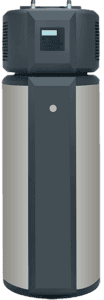
Consider a heat pump hot water heater as well
An ENERGY STAR certified heat pump water heater is up to four times more efficient and uses up to 70% less energy, on average, than a standard electrical water heater.
Heat pump water heater (HPWH) technology does not generate heat directly. It moves heat from one place to another. Heat is taken from the air in the basement or utility room (or sometimes from outside) and transferred to a tank of water.
Learn more in this booklet by Natural Resource Canada, Water Heater Guide.
And consider an ENERGY STAR certified heat pump hot water heater with guidance from Natural Resources Canada.
Frequently Asked Questions About Heat Pumps
- Do heat pumps work in Canada?
- Yes. Cold climate heat pumps work in almost all regions of the country.
- Will a heat pump save me money in Canada?
- Yes in most regions of the country with the exception in regions where natural gas or propane prices are significantlly lower than electricity prices.
- Will a heat pump save greenhouse gas emissions in Canada?
- In general yes. Definitely yes in regions with cleaner electricity grids. And increasingly yes in regions with electricity grids that are greening over time.
- When should I replace my natural gas furnace or electric baseboard heaters with a heat pump?
- Now or at least at end of life of existing space heater. Heat pumps are significantly more efficient and will provide operational savings immediately.
- When should I replace my natural gas or electric hot water storage heater with a heat pump?
- Now or at least at end of life of existing water storage heater. Heat pumps are significantly more efficient and will provide operational energy savings immediately.
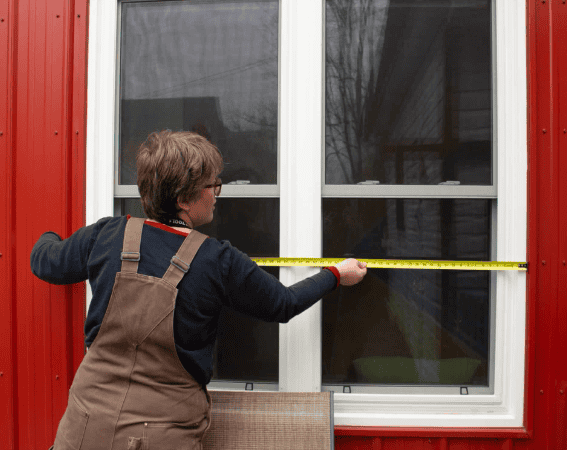
Start your deep energy retrofit today.
Save energy. Make your home more comfortable.
Have less maintenance. Keep more money in your pocket.
Glossary
ASHP: Air source heat pump
COP: Coefficient of Performance. The COP is a measure of a heat pump’s efficiency. It is determined by dividing the energy output of the heat pump by the electrical energy needed to run the heat pump, at a specific temperature. The higher the COP, the more efficient the heat pump. This number is comparable to the steady-state efficiency of oil- and gas-fired furnaces.
Design heating load (DHL): Is the amount of heat required for the house to maintain its desired indoor temperature (i.e. 72°F or 22°C) at the CSA F280 design conditions for heating at the house location.
Ductless Mini-Split ASHP: A system that uses an outdoor evaporator/condenser unit to transfer heat from outside to the inside of a building, and vice-versa, via an indoor air handling unit. A single-zone ductless mini-split ASHP uses one indoor air handling unit to heat/cool one room or zone. A multi-zone ductless mini-split ASHP uses multiple indoor air handling units to heat/cool multiple rooms or zones. The maximum number of indoor units that can be connected is determined by the specific outdoor unit specification, and can range from 2 to 8.
HSPF: Heating Seasonal Performance Factor. The HSPF is the ratio of Btu of heating delivered to watt-hours of electricity consumed over the heating season. It is used to characterise the performance of electric heating equipment over a typical heating season. A higher HSPF rating indicates a higher efficiency. HSPF ratings for ASHPs vary by “Climate Zone”.
HVAC: Heating, Ventilation and Air Conditioning
SEER: Seasonal Energy Efficiency Ratio. The SEER rating is the ratio of Btu of cooling delivered to watt-hours of electricity consumed over the cooling season. It is used to characterise the performance of electric cooling equipment over a typical cooling season. A higher SEER rating indicates a higher efficiency.
Additional glossary of heat pump related terms compiled by Natural Resources Canada.
